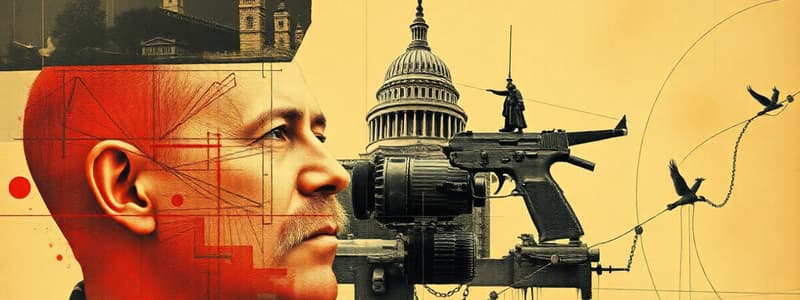Podcast
Questions and Answers
What legal characteristic of corporations allows them to maintain separate patrimony and engage in lawsuits?
What legal characteristic of corporations allows them to maintain separate patrimony and engage in lawsuits?
- Investor ownership
- Transferable shares
- Legal personality (correct)
- Limited liability
Which model prioritizes shareholder interests and views them as the highest risk-bearers?
Which model prioritizes shareholder interests and views them as the highest risk-bearers?
- Shareholder primacy model (correct)
- Stakeholder primacy model
- Corporate governance model
- Investor management model
Which system is typically not associated with countries that do not adhere to democracy?
Which system is typically not associated with countries that do not adhere to democracy?
- Communism
- Democratic Republic (correct)
- Constitutional Monarchy
- Socialism
What is a key challenge associated with the agency problem in corporations?
What is a key challenge associated with the agency problem in corporations?
What does Polanyi argue is necessary due to the existence of self-regulating markets?
What does Polanyi argue is necessary due to the existence of self-regulating markets?
Which characteristic is NOT associated with traditional societies?
Which characteristic is NOT associated with traditional societies?
Which of the following is considered a characteristic of the stakeholder primacy model?
Which of the following is considered a characteristic of the stakeholder primacy model?
According to Emile Durkheim, what exists within social groups?
According to Emile Durkheim, what exists within social groups?
What type of corporate power is defined by monopolistic control over a product or service?
What type of corporate power is defined by monopolistic control over a product or service?
Which of the following is a key departure of modern societies from traditional societies?
Which of the following is a key departure of modern societies from traditional societies?
Which component is NOT part of the core definition of the state according to Max Weber?
Which component is NOT part of the core definition of the state according to Max Weber?
One of the following is a consequence of the agency problem that can distort shareholder interests. Which is it?
One of the following is a consequence of the agency problem that can distort shareholder interests. Which is it?
Max Weber's perspective emphasizes the legitimacy of authority structures is based on what?
Max Weber's perspective emphasizes the legitimacy of authority structures is based on what?
What aspect of corporate governance is emphasized by the presence of strong unions and government regulations in the stakeholder primacy model?
What aspect of corporate governance is emphasized by the presence of strong unions and government regulations in the stakeholder primacy model?
What characterizes traditional domination as defined by Weber?
What characterizes traditional domination as defined by Weber?
Which of the following is NOT a legal characteristic of corporations?
Which of the following is NOT a legal characteristic of corporations?
Which axiom does NOT relate to Karl Marx's view on social groups?
Which axiom does NOT relate to Karl Marx's view on social groups?
Which statement best describes the concept of the state according to Jessop?
Which statement best describes the concept of the state according to Jessop?
What function of the state involves managing international relationships?
What function of the state involves managing international relationships?
What is a characteristic of modern societies as opposed to traditional societies?
What is a characteristic of modern societies as opposed to traditional societies?
What economic concept refers to the transition to wage labor due to the privatization of common lands?
What economic concept refers to the transition to wage labor due to the privatization of common lands?
What is the main economic critique by Adam Smith against mercantilism?
What is the main economic critique by Adam Smith against mercantilism?
What aspect of capitalism did Marx primarily focus on?
What aspect of capitalism did Marx primarily focus on?
What role did colonial powers play in the development of modern capitalism?
What role did colonial powers play in the development of modern capitalism?
Which of the following best defines colonization?
Which of the following best defines colonization?
How did colonialism influence social hierarchies based on race?
How did colonialism influence social hierarchies based on race?
What are some long-lasting effects of colonisation?
What are some long-lasting effects of colonisation?
What was the function of chartered companies during the colonial period?
What was the function of chartered companies during the colonial period?
Why is understanding colonial legacies important for modern society?
Why is understanding colonial legacies important for modern society?
Which of the following describes the interaction of corporations with society and the state?
Which of the following describes the interaction of corporations with society and the state?
What mechanism is NOT mentioned as a way corporations exert power?
What mechanism is NOT mentioned as a way corporations exert power?
What term describes the significant wealth transfers that occurred during colonisation?
What term describes the significant wealth transfers that occurred during colonisation?
What is a fundamental belief of Marx regarding employment?
What is a fundamental belief of Marx regarding employment?
According to Marxian methodology, what is considered the dominant feature of society?
According to Marxian methodology, what is considered the dominant feature of society?
What characterizes modernity according to the content?
What characterizes modernity according to the content?
What does Marx's historical methodology focus on?
What does Marx's historical methodology focus on?
What does disembedding of social systems entail in the context of modernity?
What does disembedding of social systems entail in the context of modernity?
What fuels the dynamics of modernity as described?
What fuels the dynamics of modernity as described?
What does the proletariat class represent in Marx's analysis?
What does the proletariat class represent in Marx's analysis?
Which of the following is NOT a key institution associated with modernity?
Which of the following is NOT a key institution associated with modernity?
Study Notes
Marxian Methodology
- Karl Marx was a German philosopher and political scientist who believed people should be free to choose their employment without restrictions.
- Marx focused on class struggle and the differences between the bourgeoisie (wealthy, controlling means of production) and the proletariat (working class).
- Marx developed three methodologies:
- Materialist: Economic structure is the primary influencer of societal elements.
- Historical: Analyses the evolution of the mode of production over time.
- Dialectical: Focuses on tensions and contradictions within a system, driving change.
Hundred Years of Peace (Polanyi)
- This period (1815-1914) witnessed the rise of capitalism, modernity, democracy, and the state.
- Modernity is characterized by technological advancements, scientific progress, and a shift away from traditional societies.
- Modern institutions include the nation-state and economic systems reliant on fossil fuels.
- Modernity leads to the commodification of products and wage labor, resulting in industrial work, alienation, and rebellions.
- Polanyi argued against a self-regulating market, believing it undermines society and requires protective measures.
Traditional vs. Modern Society
- Traditional societies are characterized by conservatism, family-driven status, limited division of labor, and reliance on nature.
- Modern societies are characterized by the modern state, capitalism, urbanism, and individualism.
Discipline of Structure
- Emile Durkheim: Emphasized the existence of social groups with rational structures, the reality of social facts, and the importance of institutions in shaping collective beliefs and behavior.
- Karl Marx: Focused on the lack of internal unity within groups, seeing hierarchy and struggle as drivers of social change.
- Max Weber: Viewed social groups and states as containing conflicts, arguing that legitimacy is granted to structures based on their potential for survival and group advantage.
The Concept of the State
- Max Weber defined the state as a human community that holds the monopoly of legitimate force within a specified territory.
- Components of the state include territory, violence/force, and a population.
Forms of Domination
- Traditional: Based on patriarchal or monarchical authority, obedience stems from tradition.
- Charismatic: Based on a leader's personal appeal and direct connection to the masses, relationships are volatile.
- Rational-legal: Based on legality and authority exercised through a bureaucratic framework, separating administrators from authority holders.
State as a Social Relation
- Jessop viewed the state as a power exercise reflecting a changing balance of forces, shaping politics within specific contexts.
- Sovereignty is relational, requiring consent from social groups for legitimacy.
- The state governs territory, manages social interactions, ensures security, and establishes international relations.
Enclosure and Class Development
- Enclosure was the privatization of common lands, creating a new class of wage workers.
- This transition to capitalism required labor commodification.
Contributions of Key Economists
- Adam Smith: Criticized mercantilism, emphasizing wealth generation from labor.
- David Ricardo: Advocated for free trade and specialization benefits.
- Marx: Focused on class struggles and the development of capitalism.
Understanding Colonialism and Its Importance
- Colonialism was a political and economic process crucial for modern society and the rise of capitalism.
- It went beyond European origins, involving slavery and war, which subordinated much of the world.
Economic Impacts of Colonisation
- Colonial powers built industrial capacity through the extraction of commodities, facilitating the capitalist system.
- Wealth transfers occurred through land appropriation and exploitation of labor via enslavement and servitude.
Political Control and Racial Dynamics
- European military control led to social hierarchies constructed around race to justify oppression.
- These hierarchies established institutions that perpetuated systemic racism and white supremacy.
Legacy of Colonialism
- Colonialism has left lasting economic and social disparities and racial inequalities.
- Systemic racism persists in business practices, impacting marginalized communities.
The Role of Joint-Stock Companies
- Chartered companies acted as quasi-sovereign entities, influencing laws and business practices.
- These companies held monopolistic privileges and were instrumental in shaping modern corporations.
Implications for Modern Society
- Understanding colonial legacies provides insight into contemporary economic and social inequalities.
- The historical context of colonialism is essential for addressing systemic racism within business practices.
Society, Business, and State Interaction
- Corporations interact with society, business, and the state through policies, regulations, interests, and socio-economic dynamics.
- SMEs and family businesses play significant roles alongside corporations.
- Taxation and legal norms shape corporate operations within broader contexts.
- Corporations exert influence through lobbying, media influence, and social mobilization.
Legal Characteristics of Corporations
- Corporations hold legal personality, allowing them to sue and be sued, enter into contracts, and maintain separate patrimony.
- Limited liability shields owners from creditors, leading to diversified risks.
- Transferable shares exist, allowing ownership changes.
Shareholder Primacy Model
- The mainstream model prioritizes shareholders' interests as they bear the most risk.
- Shareholders are seen as 'principals' who link all business participants through contracts.
- This model views corporations as legal fictions balancing conflicting objectives.
Agency Problem
- The separation of ownership and control in public corporations creates an agency problem, where directors and executives act as agents of shareholders.
- Issues include excessive compensation, irrational risk-taking, and misreporting, which can distort shareholder interests.
Stakeholder Primacy Model
- An alternative model considers the interests of multiple stakeholders: workers, governments, communities, clients/customers, and financial institutions.
- Regulation, strong unions, and community participation are crucial in this model.
Corporate Power
- Monopoly is defined by control over a product or service that dictates access terms for others.
- Corporations can exert political influence, control markets, and mislead the public.
- Power is categorized as compulsory, structural, and ideological, impacting rules and political legitimacy.
Studying That Suits You
Use AI to generate personalized quizzes and flashcards to suit your learning preferences.
Related Documents
Description
Explore the core tenets of Marxian methodology, focusing on materialism, historical context, and dialectical analysis. Additionally, examine the Hundred Years of Peace, characterized by the rise of capitalism and modern institutions from 1815 to 1914.




